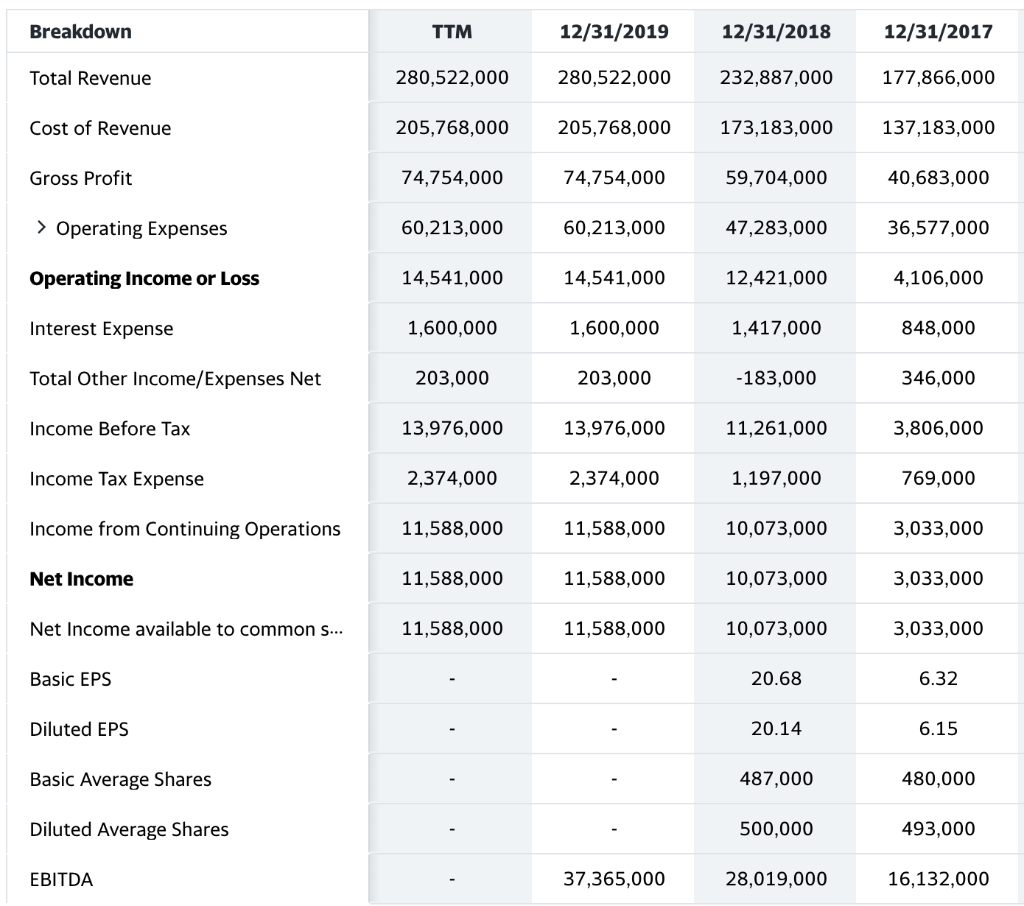Question
Income Statement Analysis: In this section, answer the following for the trend analysis: What is the total revenue, total costs of revenue and net income

Income Statement Analysis: In this section, answer the following for the trend analysis: What is the total revenue, total costs of revenue and net income for each year the past 3 years for Amazon.com? How have these numbers changed over the three years and what could be some reasons why these numbers have changed the way they have? In addition, pick at least one appropriate (for this statement) ratio or financial in addition to what is provided and calculate that and explain it. See the section on ratio analysis below for ideas.
Ratio Analysis: In addition to the trend analysis above, it is customary to also analyze ratios. Some commonly used ratios are:
- Beta: A measure of risk that is usually published and not calculated by you (A beta greater than 1 suggests that the company is more volatile/risky than the market)
- Current ratio = Current Assets/Current Liabilities (A current ratio greater than 1 means the company has enough assets to cover all current liabilities should the need arise)
- Quick ratio = (Current Assets Inventory)/Current Liabilities (When you are dealing with a company that carries a lot of inventory, a quick ratio is a better indicator than a current ratio because it acknowledges that inventory is not typically liquid).
- Profit Margin = Net Income/Sales (Represents how much of each dollar in sales remains after all costs are covered)
- Return on Equity = Net income/Total equity (Represents the return for all holders of equity in that company)
- EBIT Return on Assets = EBIT/Total assets (Represents the pre-tax return on the total net investment in the firm from operations or alternatively, how efficiently management has used assets)
- Debt-equity ratio = Total debt/Total equity (Represents the long term solvency or financial leverage in that company)
Breakdown TTM 12/31/2019 12/31/2018 12/31/2017 Total Revenue 280,522,000 280,522,000 232,887,000 177,866,000 Cost of Revenue 205,768,000 205,768,000 173,183,000 137,183,000 Gross Profit 74,754,000 74,754,000 59,704,000 40,683,000 > Operating Expenses 60,213,000 60,213,000 47,283,000 36,577,000 Operating Income or Loss 14,541,000 14,541,000 12,421,000 4,106,000 Interest Expense 1,600,000 1,600,000 1,417,000 848,000 Total Other Income/Expenses Net 203,000 203,000 -183,000 346,000 Income Before Tax 13,976,000 13,976,000 11,261,000 3,806,000 Income Tax Expense 2,374,000 2,374,000 1,197,000 769,000 Income from Continuing Operations 11,588,000 11,588,000 10,073,000 3,033,000 Net Income 11,588,000 11,588,000 10,073,000 3,033,000 Net Income available to common s... 11,588,000 11,588,000 10,073,000 3,033,000 Basic EPS 20.68 6.32 Diluted EPS 20.14 6.15 Basic Average Shares 487,000 480,000 Diluted Average Shares 500,000 493,000 EBITDA 37,365,000 28,019,000 16,132,000
Step by Step Solution
There are 3 Steps involved in it
Step: 1

Get Instant Access to Expert-Tailored Solutions
See step-by-step solutions with expert insights and AI powered tools for academic success
Step: 2

Step: 3

Ace Your Homework with AI
Get the answers you need in no time with our AI-driven, step-by-step assistance
Get Started


